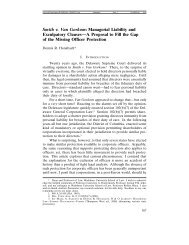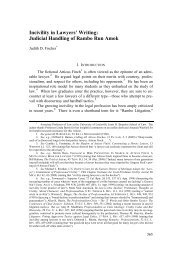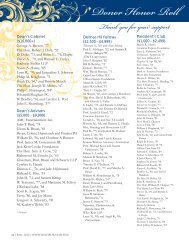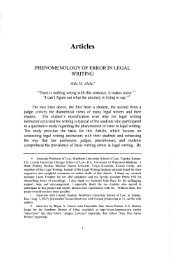Washburn Lawyer, v. 48, no. 1 - Washburn University School of Law
Washburn Lawyer, v. 48, no. 1 - Washburn University School of Law
Washburn Lawyer, v. 48, no. 1 - Washburn University School of Law
You also want an ePaper? Increase the reach of your titles
YUMPU automatically turns print PDFs into web optimized ePapers that Google loves.
EXPERIENTIAL LEARNING:<br />
<strong>Washburn</strong> <strong>Law</strong> Clinic<br />
The <strong>Washburn</strong> <strong>Law</strong> Clinic<br />
has seen many milestones<br />
in its 40-year history. With<br />
approximately 140 cases<br />
opened each year by <strong>Law</strong><br />
Clinic faculty and students,<br />
that translates to 5,600 cases,<br />
representing an even greater<br />
number <strong>of</strong> people who have<br />
been assisted during the clinic’s<br />
history. These are individuals<br />
and families who, because<br />
<strong>of</strong> their fi nancial situation,<br />
could <strong>no</strong>t have afforded legal<br />
services and quite possibly<br />
would have fallen through the<br />
cracks in the legal system.<br />
John Francis, Pr<strong>of</strong>essor and Director<br />
<strong>of</strong> the <strong>Law</strong> Clinic, described the<br />
<strong>Law</strong> Clinic’s growth and program<br />
th<br />
additions as “steady yet gradual,” and<br />
that during the <strong>Law</strong> Clinic’s storied<br />
history its mission has remained<br />
two-fold. “Our mission is to help law<br />
students become skilled and ethical practitioners and to<br />
provide an important service to the community in which<br />
we work and live.” His philosophy for directing the dayto-day<br />
operations <strong>of</strong> the clinic ties directly to the <strong>Law</strong><br />
Clinic’s mission. With respect to students, he said it is to<br />
“get them so well-prepared and ready on the front end<br />
that when the lawyering event occurs, the students are<br />
ready to go and don’t need intervention.”<br />
In addition to hands-on practical skills, the <strong>Law</strong> Clinic<br />
experience also provides students a reality check. “Clinic<br />
gives them an eye-opening view <strong>of</strong> the pr<strong>of</strong>ession. The<br />
realities <strong>of</strong> life for those without substantial means can<br />
confront students in this work,” Francis commented.<br />
With respect to the <strong>Law</strong> Clinic’s clients, Francis said the<br />
client’s needs are paramount. “We keep the client in the<br />
center <strong>of</strong> everything, <strong>of</strong> the representation, and <strong>of</strong> the<br />
decisions that are made. When we present options to a<br />
client, we present the effects <strong>of</strong> each possible choice so<br />
they understand the impact <strong>of</strong> their decisions.”<br />
24 | FALL 2010 | WWW.WASHBURNLAW.EDU<br />
SUCCESS OF CLINIC BASED ON MISSION<br />
Gregory Parker, ’04, Laurel, Md., talks with<br />
Efrain Soto, ’04, Chicago, Ill., Dean Thomas Romig,<br />
and Pr<strong>of</strong>essor John Francis at the Clinic’s<br />
40th anniversary celebration.<br />
When the <strong>Law</strong> Clinic opened<br />
in 1970, the clinical model was<br />
in its infant stage and teaching<br />
legal doctrine was the main<br />
method <strong>of</strong> educating law<br />
students. However, <strong>Washburn</strong><br />
<strong>Law</strong> faculty and staff forged<br />
ahead believing in the<br />
practical benefi ts <strong>of</strong> providing<br />
students the opportunity to<br />
represent real people in real<br />
cases. “Doctrine is incredibly<br />
important to have as a<br />
foundation, and Clinic builds<br />
on that foundation,” Francis<br />
explained.<br />
The <strong>Law</strong> Clinic’s accomplishments<br />
include winning appeals at the 10th<br />
Circuit Court <strong>of</strong> Appeals and arguing<br />
issues ahead <strong>of</strong> its time. According to<br />
Francis, some <strong>of</strong> the most signifi cant<br />
steps forward were adding Pr<strong>of</strong>essors<br />
Janet Jackson and Aliza Organick,<br />
who launched the Small Business and<br />
Transactional <strong>Law</strong> Clinic and the State and Tribal Court<br />
Practice Clinic, respectively.<br />
Students and faculty have been practicing in the Prairie<br />
Band Potawatomi Nation and Kickapoo Nation Tribal<br />
Courts since 2004 when Pr<strong>of</strong>essor Organick began<br />
teaching in the Clinic. The <strong>Law</strong> Clinic generally handles<br />
two or three cases in the Kansas tribal courts each<br />
semester and is the only law school in Kansas with a<br />
tribal court practice. This requires an understanding <strong>of</strong><br />
the history <strong>of</strong> Federal Indian <strong>Law</strong> and Tribal <strong>Law</strong>, which<br />
translates into a commitment <strong>of</strong> more time and effort<br />
• Cases opened in 2009: 146<br />
• Cases opened to date (Oct. 15) in 2010: 141<br />
• Average enrollment during the last fi ve years<br />
(2006-10) for the <strong>Law</strong> Clinic: 69 students per year<br />
• Number <strong>of</strong> clinic alumni: approximately 2,000<br />
• Completed clinic intakes January-October 2010: 355






